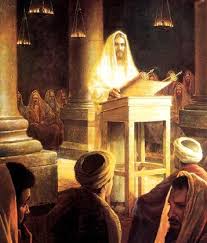Fourth Sunday in Ordinary Time, Year B – February 1, 2015

Fourth Sunday in Ordinary Time, Year B – February 1, 2015
Jesus is not a solitary prophet but one who calls companions “to be with him;” he enters the lives of four people in the first Chapter of Mark, engaged in their ordinary occupations, simply says, “Follow me,” and they immediately leave everything to follow him.
The story of Jesus in the Capernaum synagogue inaugurates the first day of his ministry that consists of exorcisms and healings
The story of Jesus in the Capernaum synagogue inaugurates the first day of his ministry that consists of exorcisms and healings. The story reflects contemporary Jewish thought that the coming of God’s kingdom would mark the defeat of evil, which is personified in an array of demons and unclean spirits. Jesus’ word is so powerful that people abandon their occupations and follow him, and even demonic powers are powerless before it. Jesus summons people to a change of heart, to take a new look at their lives and put their trust in the good news. This is not simply a story from the past, but one that continues to speak powerfully and prophetically to people today.
On this Fourth Sunday of Ordinary time, both the first reading(Deuteronomy 18:15-20) and the Gospel (Mark 1:21-28) raise the issue of the authority of those who speak the Word of God. Jesus confronts and addresses Satan directly. Satan knows who Jesus is because of his powerful angelic intelligence but he refuses to surrender, to obey to God, he refuses to love.
Authentic prophets taught with authority because God put his own words into their mouths. In the first reading, Moses tells the people that God will send a prophet from the line of the Israelites. God commands everyone to listen to this prophet, who we come to recognize as Jesus.
Jesus astonishes the people in the Capernaum synagogue with his teaching and authority. He taught with authority because he is the living Word of God. We are all witnesses to this living Word who is Jesus. We have no authority of our own; we simply proclaim his Word. Each member of the Church, by virtue of baptism and confirmation, has a prophetic role, and echoes the Word of God himself, both by words and example. We must walk our talk!
Two of the most misused and misunderstood words in our day are “prophet” and “prophetic.” In the popular mind, prophets fall into some well-worn stereotypes, always standing outside, protesting the system. They might be dressed poorly, shouting out and embarrassing the polite and the elite! For many such prophets, anger seems to be a signature emotion.
Yet in the Bible, prophecy often looks very different. There were certainly those lone prophets like Elijah and John the Baptist, but more often prophets were fully integrated into the “systems” and “structures” of their times. Think of Jeremiah, who came from the fallen priestly house of Eli; and Ezekiel, Zechariah and Isaiah were also priests and prophets of the court. Prophets appeared in the courts of the kings of Israel. In the moving story of King David, the prophet Nathan rebuked the king for adultery and murder but he was also capable of some rather discrete maneuvering in his efforts to put Solomon on the throne!
Authentic prophets were strident opponents of the status quo. They recognized and felt the injustice that kings and priests and false prophets wanted to whitewash. They shared the groans of the oppressed poor, of widows, orphans and the dispossessed, and articulated those groans in cries of woe. They denounced the system, but denounced a system in which they were often enmeshed. They experienced deeply what was wrong with that system, and did everything they could to bring about change from within the system. It’s far too easy to denounce from a distance. Gestures of repudiation and condemnation cost so little, and adding the term prophetic may lend an aura of piety, importance and savvy to one’s reputations and works. But they don’t accomplish their goal of bringing about conversion, transformation and renewal. Prophets in the Bible cannot afford gestures. They are called to speak the word of the Lord from within the court, often wreaking havoc in the process! Authentic prophets spoke the truth face-to-face with power, to powerful men and women whom the prophets knew intimately, frequently from their own position of power. And often, the prophets were in the employ of those whom they challenged!
Finally, a word on our own “prophetic” efforts to bring about change in the Church. I will be forever grateful to the late Jesuit Cardinal Avery Dulles for having instilled these ideas in my mind and heart years ago. The then Father Dulles said that reformers ought to speak prophetically. This may well be true, provided that the nature of prophecy be correctly understood. Father said that St. Thomas Aquinas made an essential distinction between prophecy as it functioned in the Old Testament and as it functions within the Church. The ancient prophets were sent for two purposes: “To establish the faith and to rectify behavior.” In our day, Father Dulles continued, “the faith is already founded, because the things promised of old have been fulfilled in Christ. But prophecy which has as its goal to rectify behavior neither ceases nor will ever cease.” How do we speak the Word of God with authority today? How do we use our authority to further the Kingdom of God? How are our words, gestures, messages and lives prophetic today, in the Church and in the world?
Recent Sermons

Easter Sunday – The Resurrection
April 14, 2017

4th Sunday of Lent Year A – The Man Born Blind
March 27, 2017

3rd Sunday of Lent Year A – The Samaritan Woman at the Well
March 20, 2017



